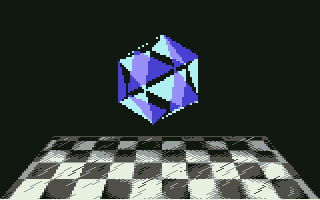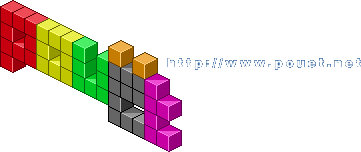Noobish question...
category: general [glöplog]
Help me motherfuckers :D
Is Second Reality's two Glenz part:
- glenz is iside the glenz
- glenz is outer but partially intersected the big glenz
Any coders can say which one above is correct, because my 50 euros is on the pot!!
I said that you cant do glenz inside glenz.
Is Second Reality's two Glenz part:
- glenz is iside the glenz
- glenz is outer but partially intersected the big glenz
Any coders can say which one above is correct, because my 50 euros is on the pot!!
I said that you cant do glenz inside glenz.
There is no stupid question, only stupid people.
As I see it in youtube, the big glenz is behind the small glenz but they still glenz each other.
Why you can't do glenz inside glenz? What's the limitation?
Why you can't do glenz inside glenz? What's the limitation?
I once had an argument with my brother about the direction of the rotation (CW or CCW? :) when the dude in the Barbarian game on CPC makes the decapitation move. I thought he made 180 degrees CW and then 180 back with haste. They thought 360 degrees. Oh well..
you can do glenz inside glenz, but only if it doesn't conflict with your anit-virus.
try turning it off!
try turning it off!
It really pisses me off that glenz is considered an effect deserving of its own name. It's just drawing polygons with transparency, for fuck's sake, and you can do that with an OR instruction. If anything it's actually easier than not-glenz polygons, because you don't have to z-sort them. It's like calling "not having a scroller" an effect.

gasman: its like calling a blur-effect a fire-effect. its not a real fire! but its still a fire-effect
same with interference effect. its just a xor instruction.
or with zebras
moredhel:
are you talking about the objects or the glenz-filler?
i think its a big difference between the two.
also a question is if they use z-buffering or not. if they use it, then an intersection would discard pixels behind the nearest object. youtube video is crappy so i cant see the pixels very well. if they dont use zbuffering then an "insersection" would not be the case here. then they just overlap eachother and pixels are overdrawn with or'ing or something.
its better to ask the coders that did 2ndreal demo. they would know the render-code.
Quote:
- glenz is iside the glenz
- glenz is outer but partially intersected the big glenz
are you talking about the objects or the glenz-filler?
i think its a big difference between the two.
also a question is if they use z-buffering or not. if they use it, then an intersection would discard pixels behind the nearest object. youtube video is crappy so i cant see the pixels very well. if they dont use zbuffering then an "insersection" would not be the case here. then they just overlap eachother and pixels are overdrawn with or'ing or something.
its better to ask the coders that did 2ndreal demo. they would know the render-code.
I'm for the cheap OR option suggested by gasman...
z-buffer on a 386...?! At maximum I'd say a painter's algorithm.
z-buffer on a 386...?! At maximum I'd say a painter's algorithm.
broderick: exactly, and thats why intersection is unlikely to be the case here.
People what are you talking about please?
Glenz is:
- use 3 bitplanes
- for (all polys)
if (frontside) draw into bitplane 0 and 1
else draw into bitplane 0 and 2
(replace "draw into bitplane x" by "OR bit x into pixels" if you've got a non-planar mode)
If you want two of them, use 6 bitplanes (0,1,2 for the first one, 3,4,5 for the second).
The fun thing is: If glenz 1 is in front of glenz 2 or not, if they're transparent, if they're inside each other etc. is ENTIRELY a matter of writing the right colors into your palette. Once. Done.
Glenz is:
- use 3 bitplanes
- for (all polys)
if (frontside) draw into bitplane 0 and 1
else draw into bitplane 0 and 2
(replace "draw into bitplane x" by "OR bit x into pixels" if you've got a non-planar mode)
If you want two of them, use 6 bitplanes (0,1,2 for the first one, 3,4,5 for the second).
The fun thing is: If glenz 1 is in front of glenz 2 or not, if they're transparent, if they're inside each other etc. is ENTIRELY a matter of writing the right colors into your palette. Once. Done.
if it's blending additively than who cares about front/back anyway? it's not like addition isnt commutative :)
kb_, come on. You find the silhouette of the object, then you draw it into bitplane 0. Then you draw "a mesh with half of the polys removed" (like in the screenshot above): frontside to bitplane 1, backside to bitplane 2. That's the way you beat records. (the screenshot above is not of a real glenz-thing. it got holes, since they didnt fill in the silhouette. Probably some lame pc-demo ;) )
Yeah, I figured out that I screwed up the explanation shortly after posting but I was quite sure some old Amiga legend/fart will come and correct me :)
Doesn't change the thing about the two glenz objects and "it's all the palette, stupid" tho :)
Doesn't change the thing about the two glenz objects and "it's all the palette, stupid" tho :)
Yep, I'm too old to be posting in the raymarching-thread anyway. But in this thread I AM KING!
ALL HAIL THE KING OF THE GLENZ-THREAD!
Just a small correction for the king: The screenshot above is from Second Reality 64! With amazing music from kb_ BTW ;-)
While we're at it... what's the origin of the name "glenz" for this kind of effect? It's not even a normal word as far as I can tell, so who invented it? :)
RufUsul: ah, the enlightenment.. I assumed it was second reality pc :) thanks, humble servants.
jua: Glenz is a swedish term, as far as i remember.
jua: Glenz is a swedish term, as far as i remember.
hehe, come to think of it -- wasnt there something called "blenk-vectors" too?? never quite got the hang of the terminology back then :)
I'm sure I read somewhere that it was short for "glass lens". Although that would be a bit silly come to think of it, since they don't behave like a lens in any way.
"Glins" means something like "shine" in Norwegian. I assume "glens" is the Swedish equivalent.
